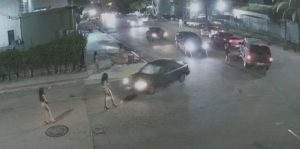A growing movement in California aims to legalize prostitution or “sex work.” The state started the process last year by decriminalizing loitering for prostitution with the passage of SB 357. While this law doesn’t legalize prostitution, it does handicap law enforcement efforts to deter the most dangerous form of prostitution affecting our poorest neighborhoods: street walking. Advocates of decriminalizing prostitution claim that doing so would protect the health and safety of all involved, protect prostitutes from abuse by destigmatizing the practice, eliminate barriers to reporting assaults to police, and allow police resources to focus on “more serious” issues related to sex trafficking. However, this is far from the truth. Eliminating laws against prostitution would do far more harm to California communities than good.
This is the point made by human trafficking experts from the National Center on Sexual Exploitation, Dr. Micheal Shively and Dr. Stephany Powell in an column they wrote recently for Newsweek. “Legalization has been tried many times, in many places, in many forms, over many decades, and failed every time,” Shively and Powell wrote. “One need not accept promises and assertions about what might or should happen. One need only look at what does happen. Full decriminalization, de facto decriminalization via “tolerance zones” or non-prosecution policies, and legalization all fail to deliver on any of the promised benefits.”
They go on to argue that when “sex work” is legalized, the sex trade and sex trafficking skyrocket. The US Department of Justice makes the same point reporting that prostitution and sex trafficking of women have “an intimate relationship,” as the two are “fundamentally interrelated.” As legalized prostitution expands, so too does human trafficking.
When New Zealand removed prohibitions on prostitution, its law enforcement was greatly limited in their ability to investigate sex trafficking cases or punish participants. The decriminalization of prostitution made it almost impossible to identify victims of sex trafficking. As a result, the U.S. State Department lowered New Zealand’s annual global Trafficking in Persons Report rankings from a Tier I to a Tier II.
Similarly, Boston attempted to control its prostitution problems in the 1960s and 1970s by permitting “sex work” within a few blocks. Soon after, the area, known as the “combat zone,” became incredibly dangerous, as abuses against sex trade survivors skyrocketed.
Since decriminalizing prostitution has been tried and found to cause significant safety concerns, there is no reason to implement such a detrimental change in the law in California.
Shriver and Powell highlight California’s mistaken approach with the passage of SB 357, a bill to decriminalize loitering for the purposes of prostitution. California police used the state’s loitering law as a key tool to punish pimps and traffickers. It acted as the foundation for probable cause to begin investigations because it allowed law enforcement to identify victims and separate them from their exploiters.
Even before the SB 357 went into effect on January 1, cities were already feeling the impact. Alejandra Sotelo-Solis, the mayor of National City near the San Diego Naval Base, sent a letter to Governor Newsom asking him to repeal or amendment to SB 357, right after he signed it, because of an explosion of prostitution in her city at all hours of the day.
In South Los Angeles, street prostitution on Figueroa Street is out of control. CBS News LA recently highlighted the work of a high school English teacher and her students who have taken to the streets to protest the open prostitution and resulting violence happening within their residential neighbors. “You can’t walk up and down Figueroa. It is very dangerous,” said a female student in a CBS interview. “Our community has had enough.”
Oakland residents are also complaining that pimps are now boldly selling scantily-clad women in their neighborhoods in broad daylight to men clogging their streets in their slowly moving cars. The East 15th Street neighborhood in particular is calling on city leaders to take action and protect their families.
A report from KPIX-TV showed young women, many of whom are sex trafficking victims, walking through a neighborhood in broad daylight soliciting customers while a life-long resident pushes her child in a stroller.
The Oakland Police Department arrested 68 traffickers and exploiters in 2021 using the law that prohibited loitering for prostitution. During the first nine months of 2021, nine sex-trafficked children were rescued thanks to that law. Now that this law has been rolled back, those rescues will be much more difficult.
Fully decriminalizing prostitution would allow traffickers and pimps to scour the community for women and children to victimize without fear of consequences. Keeping prostitution illegal, on the other hand, keeps victims away from individuals looking to take advantage of them.
The state should never allow an inherently dangerous practice to expand in our communities. Rather than reducing harm, decriminalization only creates an unsafe environment for everyone.




